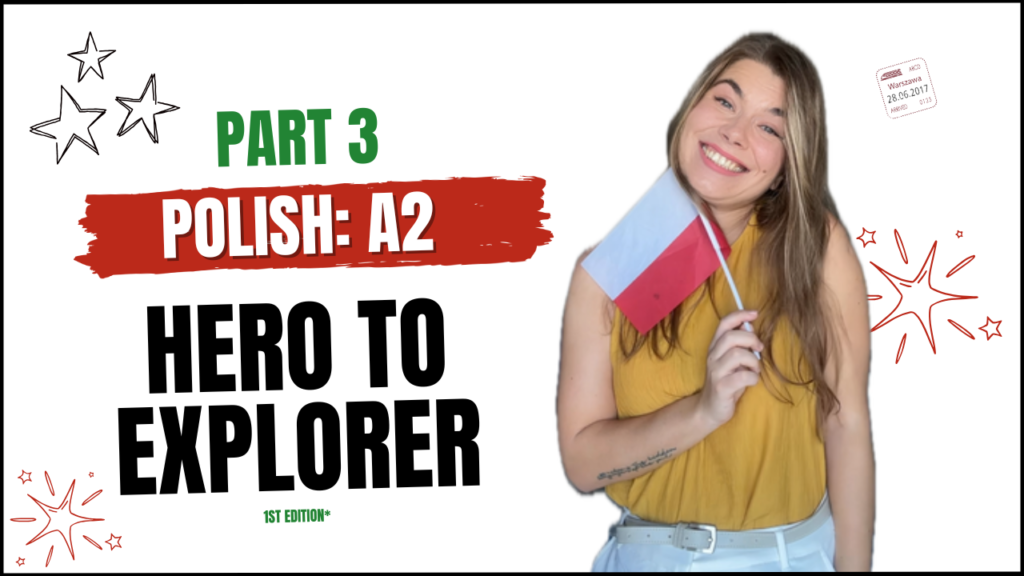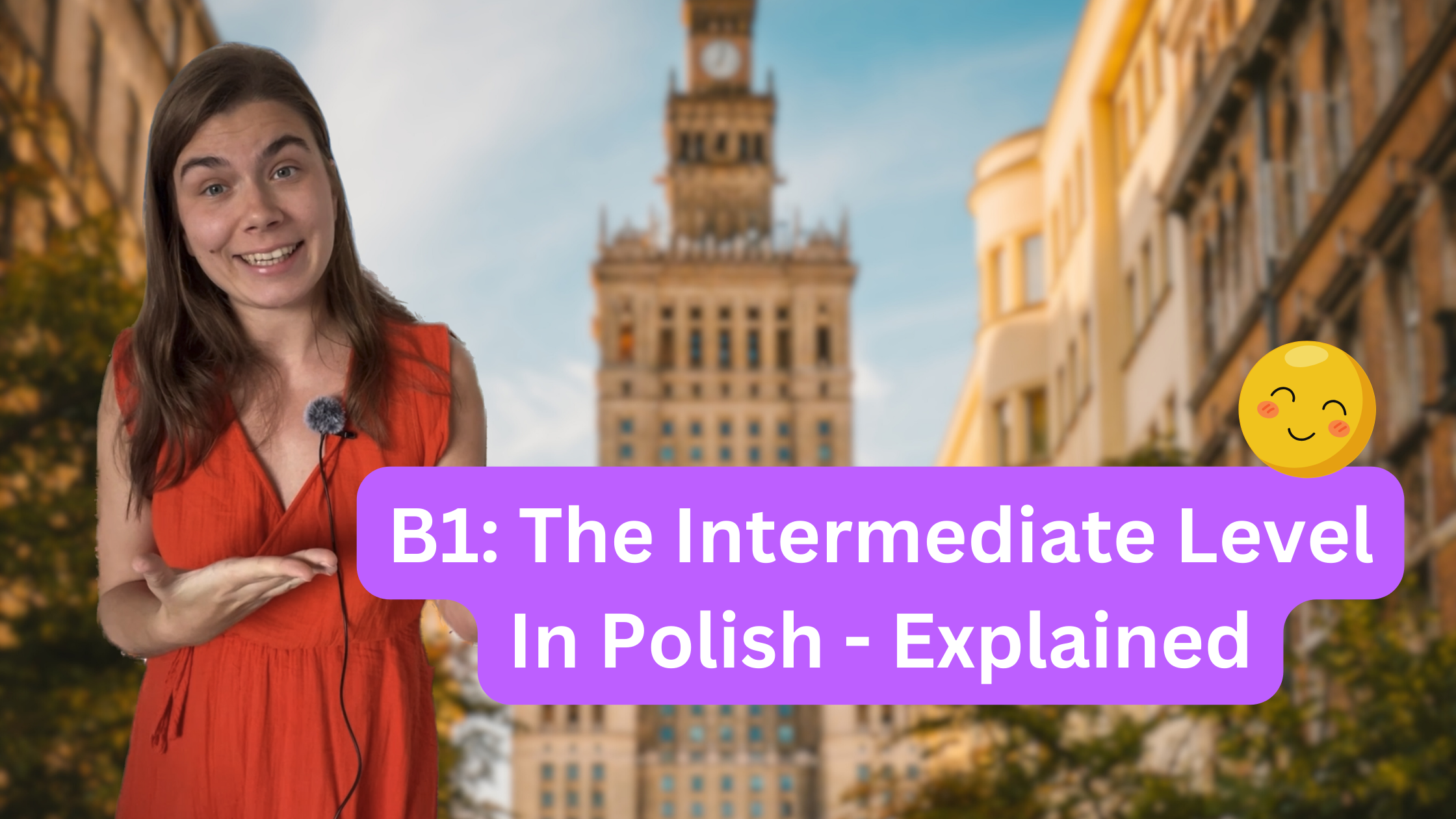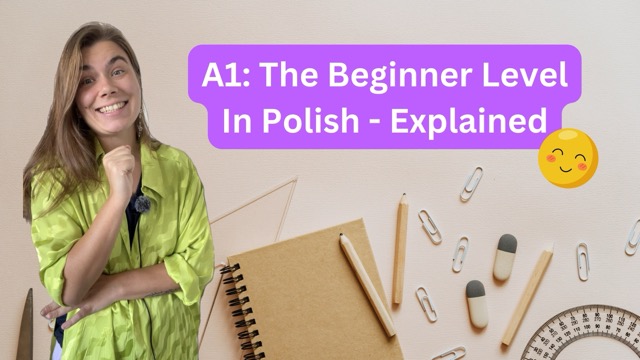What do you need to know in Polish at the upper beginner level (A2)?
November 22, 2023 | by completepolishcourse@gmail.com

Welcome to the Polish adventure at the upper beginner level (A2)! If you’re wondering what lies ahead and what you need to conquer, you’re in the right place. This guide is your passport to understanding the key elements – nouns, pronouns, adjectives, numerals, cases, verbs, and adverbs – that will boost your Polish level.
We’re about to navigate through the intricacies of noun and adjective conjugations, wrap our heads around different cases, and explore the fascinating world of Polish verbs and adverbs. By the end, you’ll be armed with the essentials for A2-level proficiency. Ready? Let’s dive in!
What an A2 level Polish course should cover?
Let’s explore what exactly is being covered at the A2 level in Polish.
Nouns on A2 level in Polish:
- Revision of the categories of nouns and adjectives
- Conjugation of nouns through all cases in both singular and plural:
- Conjugation of nouns in masculine gender ended by a consonant like: obcokrajowiec, pasażer, pianista
- Conjugation of nouns in masculine gender ended by a vowel -a like: artysta, poeta
- Conjugation of nouns in femenine gender ended by a vowel -a, or -i like: miska, pani
- Conjugation of nouns in masculine gender ended by a consonant like: mysz, sól, krew
- Conjugation of nouns in neuter gender ended by -o, -e like: śniadanie, słowo
- Conjugation of nouns in masculine gender ended by -um like: stypendium, centrum, liceum
- Conjugation of irregular nouns like: przyjaciel, człowiek, dzień, tydzień
- Revision of nouns conjugation of both – the subject and the ending like: dom-u, koleżank-ę, biurk-a
- Alterations of vowels and consonants in the subject like: dzień – dnia, obcokrajowiec – obcokrajowca, miasto – w mieście
Pronouns on A2 level in Polish:
- Conjugation of pronouns in both singular and plural:
- Personal pronouns by all cases: ja, ty, on, ona, ono, my, wy, oni, one, państwo, pan, pani
- Demonstrative pronouns in all cases: ten, ta, to
- Conjugation of the possessive pronouns through all cases like: mój, moja, moje, twój, twoja, twoje, nasz, nasza, nasze, wasz, wasza, wasze
- Interrogative pronouns: Kto? Co? as well as Jaki? Jaka? Jakie? through all cases
- The forms of interrogative pronouns Który? Która? Które? and Czyj? Czyja? Czyje? in Nominative singular and Nominative and Accusative plural non-masculine.
Learn Polish Basics on Adjectives & Numerals:
- Conjugation of adjectives in both singular and plural by all cases:
- Conjugation of masculine adjectives ending with -y like: piękny, zdrowy, mały, duży and those ending with -i like: tani, polski, głupi
- Conjugation of feminine adjectives ending with -a like: zdrowa, piękna, mała
- Conjugation of neuter adjectives ending with -e like: piękne, zdrowe, małe, duże
Conjugation of numerals by cases:
- Main numerals in Nominative: jeden, jedna, jedno, dwa, dwie, trzy
- Adjective conjugation of ordinal numbers in all cases in singular: pierwszy, pierwsza, pierwsze, drugi, druga, drugie
Cases you need to know at the A2 level in Polish:
Nominative Case:
Singular and Plural (including nouns in masculine personal gender)
- When it has a functional subject like: Kucharze gotują zupę.
- When it has a function of predication like: Moi przyjaciele to lekarze.
Genitive Case:
Singular:
- Direct object after the negated verbs: Nie znam tego człowieka.
- Genitive as a direct object: Słucham muzyki, Szukam masła, Potrzebuję kopert
- Genitive as an indirect object: Uczę się języka polskiego.
- Genitive as an affiliation: To jest samochód mamy.
- Genitive in measures and quantity: Piję kieliszek wina.
- After the prepositions: u, z(e), dla, do, od(e), obok, bez(e) like: Poproszę pierogi bez cebuli. Jadę z Wrocławia do Gdańska.
- Forms: Nie ma, nie było, nie będzie like: Nie ma mleka.
- After non-finite numerals (without non-masculine personal gender): Mam kilka minut.
- Genitive in dates where we talk about the day, month and year like: Marta urodziła się dwudziestego sierpnia tysiąc dziewięćset dziewięćdziesiątego trzeciego roku (20/07/1993)
- Genitive after the main numerals (5+, without masculine personal gender) like: Mamy 50 komputerów.
Dative Case:
In both singular and plural
- Personal pronouns in Dative like: Bardzo mi się podoba twoja bluzka!
- Animate nouns as an indirect object like: Daliśmy tej dziewczynie czekoladki.
Accusative Case:
In both singular and plural.
- As a direct object after the transitive verbs: Piszę list.
- After the prepositions: na, po, w(e), przez(e), o, za: like: Przeszliśmy przez skrzyżowanie.
Instrumental Case:
Both singular and plural (Reminder)
- To describe a person after the verb “To Be” (Być) & “Zostać” (To become): Ania jest studentką, Oni są rolnikami, On jest prawnikiem, Zostanę lekarzem.
- The function of the indirect object: Interesuję się tańczeniem, filmem. Zajmuję się chorą mamą
- The function of the indirect object with means of transport: Jadę taksówką, a mama jedzie pociągiem. Jem widelcem, piszę długopisem.
- After the prepositions: z(e), za, nad(e), pod(e), przed(e), między: Książka jest pod stołem, Lustro wisi nad zlewem. Mama stoi przed domem.
Locative Case:
Both singular and plural (Revision)
- After prepositions indicating a place like: na, w(e), przy: Spotkamy się na dworcu, Siedzę na fotelu.
- After prepositions indicating time of the activity: w, po, o: Będę we Wrocławiu w przyszłym tygodniu, Spotkajmy się o siedemnastej, Będę we Wrocławiu w przyszłym tygodniu.
- After prepositions indicating month or year: Moje studia zaczynają się w październiku.
- After prepositions indicating an object: Myślę o szkole. Marzę o wakacjach.
Vocative Case:
In both plural and singular. Like: Madziu! Szanowni Państwo, Panie profesorze!
What verbs do you need to know to be A2 in Polish?
Everything you need to know on A1 in Polish and additionally:
- Infinitive verbs: like rozumieć, wziąć, iść, móc, wiedzieć
- Rection of the verb: szukać kluczy, pomagać siostrze, jeść widelcem, rozmawiać o pasjach
- Subject of the Present: Brać, Biorę, Bierz
- Subject of the Past: Brać, Brał, Brałbym
- Conditional: As a form of wish, request, mild order: Chciałbym pójść do kina. Czy mógłbyś pożyczyć mi długopis? Czy moglibyście mówić ciszej?
- If-clauses: Gdybym była wysoka, to byłabym modelką. Gdybym się uczyłm, to teraz lepiej mówiłbym po polsku.
- The verbs of movement (Revision): iść/chodzić and pójść/jechać/jeździć/pojechać like: Codziennie jeżdzę do pracy samochodem, ale dzisiaj pojadę tramwajem. Chodzę na lekcje polskiego 2 razy w tygodniu.
Revision of:
- The conjugations: -ę, -esz like: jadę – jedziesz or -ę, -isz/-ysz: leżę – leżysz and -am, -asz / -em/-esz like oglądać – oglądam, umiem – umiesz
- The perfective and imperfective verbs like: brać/wziąć, dawać/dać , pomagać/pomóc
- Active and middle voice (personal forms)
- The Present: Magda zajmuje się dzieckiem w domu.
- The Past (perfective/imperfective): Długo uczyłem się polskiego, ale w końcu się nauczyłem!
- The Future tenses: Będę chodziła na lekcje hiszpańskiego co piątek. Pójdę na lekcję hiszpańskiego w piątek.
- Imperative (Revision): Napisz do mnie! Zatańcz z nią!
Let’s not forget about Polish adverbs!
- Gradation of adverbs: ładny→ ładniejszy → najładniejszy, dobry → lepszy → najlepszy ex. Maja tańczy lepiej od Marka. Ta żyrfa ma dłuższą szyję niż ten słoń. Jurek jest najprzystojniejszy ze wszystkch aktorów. (In “Zero to Hero A1” we cover the Nominative use of gradation only).
Conclusion
Reaching A2 proficiency in Polish marks a significant milestone in your language-learning journey. Mastering essentials such as noun and adjective conjugations, pronouns, adjectives, numerals, and cases equips you with the ability to engage in more nuanced conversations, articulate preferences, and comprehend a broader range of written and spoken content. It’s a testament to your progress, laying the foundation for continued growth in your Polish language skills.

Ready to boost your Polish skills?
Dive into my easy-to-follow, pre-recorded course “From Hero to Explorer“ covering the entire A2 level. Enjoy lifetime access to learn at your own pace, revisit concepts whenever you need to, and start your A2 journey today.
Ready to open the doors to fluency in Polish? 🚀
GET INSTANT ACCESS and start your journey to fluency!
Happy learning!
RELATED POSTS
View all



